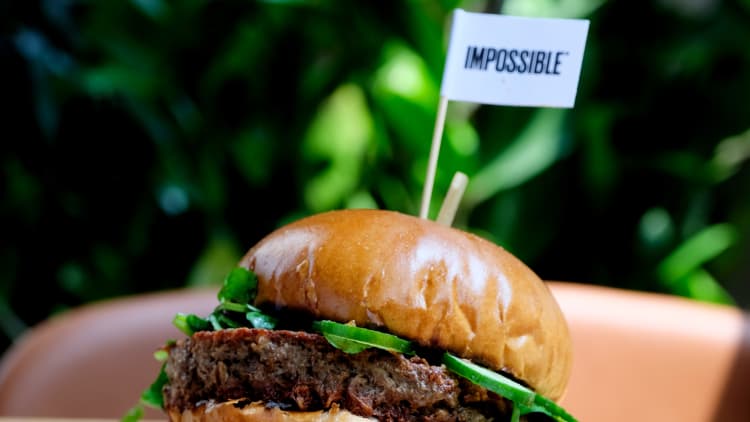
Impossible Foods, the maker of plant-based meat, sees a "huge opportunity" in China — one of the world's largest meat consuming markets, its CEO Pat Brown told CNBC.
The company was present at the China International Import Expo in Shanghai this week, where it said it expects to serve about 50,000 free samples of its plant-based meat.
"It's a huge opportunity, a perfect opportunity for us," Brown told CNBC's Eunice Yoon on Wednesday.
The aim, Brown said, was to perfect the technology so that the need for animals in the food system can be completely eliminated. "And also help China improve its food security by being able to produce its entire meat supply with its own farmers on its own land," he added.
While Chinese consumers eat various meats, pork is most commonly consumed.
Pork prices in China have soared amid a swine fever outbreak that's led to the shrinking of the country's hog population. The recent spike in pork prices has driven up the mainland's inflation and hurt the wallets of many consumers in the world's second-largest economy.
The country's pork and beef imports in September surged as China stocked up on proteins amid the decline of its hog herd, Reuters reported.
Brown explained that in China, Impossible Foods aims to find local partners to work closely with authorities and other companies to "establish a China-based industry" that produces plant-based meats for local consumers. That means both the supply of raw materials and the manufacturing process will take place within China's borders.
"Farmers in China will be responsible for China's meat supply and workers in China, for producing it insofar. That's what we're aiming for," he said, adding the company remained committed to quality control.
He declined, however, to give specific indications for a price point of the plant-based Impossible Burgers, which in other countries tend to be on the steeper side. "We want our products to be affordable to everybody in the world," he said.
In fact, the concept of vegetarian meat has been around in China for centuries. In an editorial, state-owned media China Daily reported that there were records from the Tang Dynasty (618-907 AD) that mentioned monks eating food they described as "vegetarian meat." Beijing alone has more than 300 restaurants that offer vegetarian meat, according to China Daily.
When asked about the potential competition from local players, Brown claimed vegetarian meat does not taste the same and is not something that meat lovers want. "We only want to serve meat-lovers who are uncompromising and we have to deliver everything that they love about the taste of meat."
Impossible Foods does not currently sell its products in the Chinese mainland. It would likely have to obtain necessary authorization from Beijing before it can sell to consumers.
In Europe, the company filed an application requesting to gain authorization for the use of soy leghemoglobin in the European Union. Referred to as heme, it is produced from genetically modified yeast and is used by Impossible Foods to make fake meat actually taste like meat.


